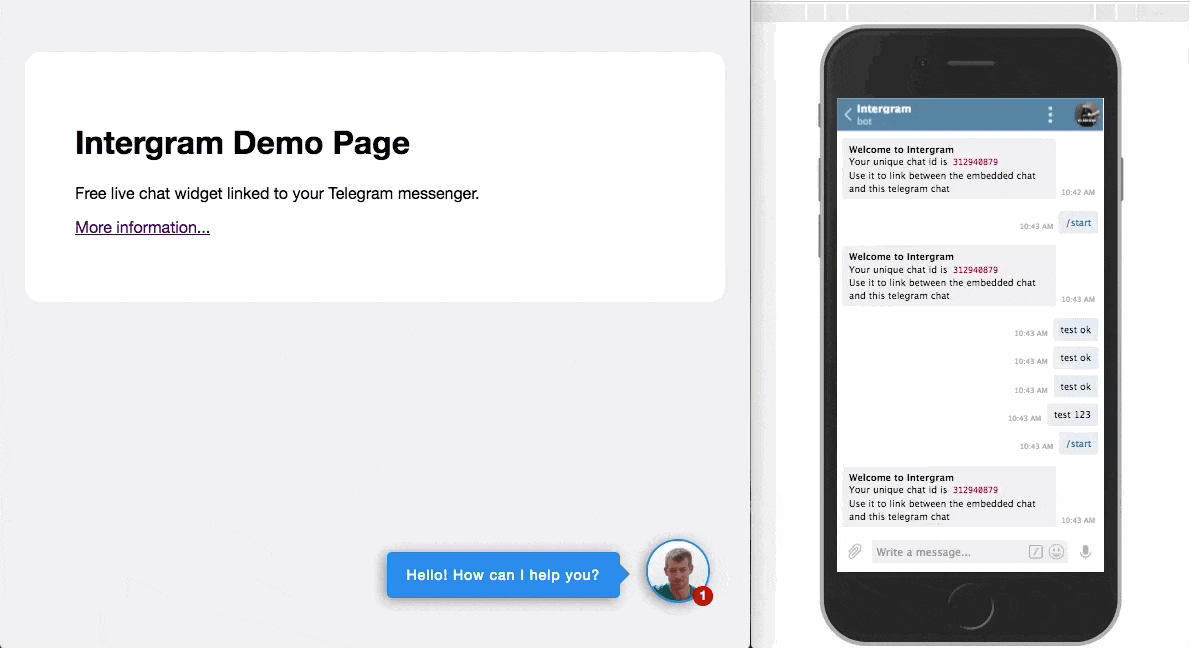Intergram - Demo
A Free live chat widget that you can easily add to your website. It will let you chat with your website visitors using your Telegram messenger.
- aslauris - Who redesgined the new UI! Check out his website - wedofe.com
You initiate a chat with my Telegram bot and add 2 lines of script to your website to embed the widget. Visitors' messages are sent from the chat widget to my bot server, which sends them to your Telegram messenger where you can answer them. You can also self-host the bot server to get more control of this process.
By using a Telegram bot, I delegate all the message routing work and chat state management to Telegram. I don't have to build fancy mobile and desktop apps for several platforms because Telegram already has a great multiplatform chat client. And, I can easily handle a huge amount of load, because my app runs completely stateless (No database) and just serves as a pipe between Telegram and the chat widget users.
- Open Telegram messenger, search for
@Intergramand hit/startto get your unique chat ID. (direct link)
- Paste this code snippet right before the closing body tag of every page where you want the chat to appear (Don't forget to add your actual chat ID).
<script> window.intergramId = "Your unique chat id" </script>
<script id="intergram" type="text/javascript" src="https://www.intergram.xyz/js/widget.js"></script>Note: replying to a specific message should be used to respond to that specific visitor. Sending a standard message will broadcast to all connected chat clients (You might find it easier to use if you have only one active conversation)
Important Notice: I plan to keep the hosted chat service 100% free (no ads also!), but there are some hosting expenses (servers, domain, cdn, etc), so I will soon start bundeling a Loadmill component with the Intergram script. Loadmill is a new concept and still in Beta - If you don't feel comfortable with this, please use your own self hosted version.
Customization - Try It
Currently you can customize all visible texts and the main widget color by setting an optional intergramCustomizations object in the injection script tag. (All its properties are also optional and will fallback to their original values)
<script>
window.intergramId = "Your unique chat id";
window.intergramCustomizations = {
titleClosed: 'Closed chat title',
titleOpen: 'Opened chat title',
introMessage: 'First message when the user opens the chat for the first time',
autoResponse: 'A message that is sent immediately after the user sends its first message',
autoNoResponse: 'A message that is sent one minute after the user sends its first message ' +
'and no response was received',
mainColor: "#E91E63", // Can be any css supported color 'red', 'rgb(255,87,34)', etc
alwaysUseFloatingButton: false // Use the mobile floating button also on large screens
};
window.intergramOnOpen = {
visitorName: 'Custom visitor name' // Will be appended to unique visitor id
};
</script>
<script id="intergram" type="text/javascript" src="https://www.intergram.xyz/js/widget.js"></script>- Using Preact helped creating a pretty minimal
jsbundle. - The widget injection script is about 5KB gziped and executes only after the host page finished loading ('onload' event).
- The chat iframe will only be loaded if the user interacts with the chat widget (currently about 40KB gziped).
-
Talk to Telegram @BotFather, create a new bot and get its API Token.
-
Deploy this repo to your own chat server.
- Clone it locally and install or if you use Heroku, fork this repository and point the new app to it.
- Set an .env variable named
TELEGRAM_TOKENwith the value you got from @BotFather
-
Point the bot webhook to your bot server by making a
GETrequest to the following urlhttps://api.telegram.org/bot<TOKEN>/setWebhook?url=<Server url>/hook(Don't forget to replace with your token and server url) -
Open a chat with your bot and hit
/startto get your unique chat ID -
Embed this code snippet in your website
<script>
window.intergramId = "Your unique chat ID"
window.intergramServer = "Server url"
</script>
<script id="intergram" type="text/javascript" src="<Server url>/js/widget.js"></script>- 🎉
Source: idoco#88
Install on Ubuntu 18.04.4 LTS to run standalone (I condense a 14 hour research and headaches into a 5 minutes install)
Make sure you have the latest node.js and npm
Create your bot with @Botfather (/newbot)
add TELEGRAM_TOKEN with the value you got from @Botfather in /etc/environment (TELEGRAM_TOKEN="theToken Value")
apt-get update && apt-get install -y curl gnupg2 git build-essential
cd /opt
git clone https://github.com/fox34/intergram
cd /opt/intergram
edit server.js and add the following at the top:
const fs = require('fs') // Required for reading the certificate and key files
let options = { key: fs.readFileSync("/opt/intergram/key.pem"), cert: fs.readFileSync("/opt/intergram/bundle.crt") };
replace the line
const http = require ('http').Server(app);
with
const http = require ('https').Server(options,app);
change the port as 3000 does not seem to be allowed -i have also added a line to see if we get the TELEGRAM_TOKEN from environment:
http.listen(process.env.PORT || 8443, function(){
console.log('listening on port:' + (process.env.PORT || 8443));
console.log(process.env.TELEGRAM_TOKEN);
});
IMPORTANT! YOUR CERTIFICATE MUST ALSO CONTAIN THE INTERMEDIATE CERTIFICATE AT THE BOTTOM OTHERWISE THE HOOK WILL NOT WORK SEE https://cubewebsites.com/guides/fix-telegram-webhooks-not-working/
Point the bot webhook to your bot server by making a GET request to the following url (just put the address in your browser)
https://api.telegram.org/bot<TOKEN>/setWebhook?url=<https://yourServerURL:8443>/hook
npm install
npm run build
npm start
you should see:
listening on port:8443
1xxxxxxxxxxxxxxxxxV10etq-UVxxxxxxxxxxxxxhAIU3XYZtkI
test by navigating on your browser to https://yourServerURL:8443 you should get the demo page
type /start in your bot in order to get the client-id
in your project:
window.intergramId = "client-id"
window.intergramServer = "https://yourServerURL:8443"



